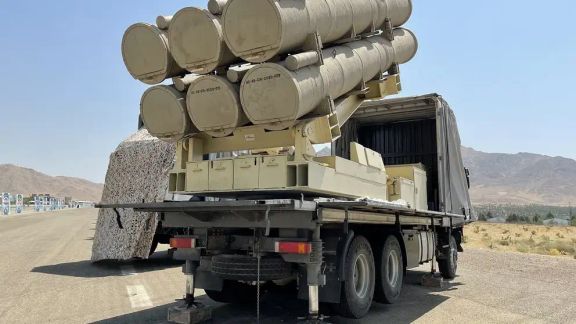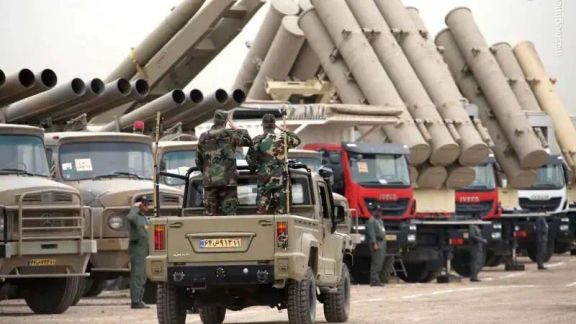EU sanctions Iran's flag carrier over missile transfer to Russia

The European Union has imposed new sanctions on Iran, targeting its national flag carrier Iran Air and other entities, in response to Tehran's supply of missiles and drones to Russia.

The European Union has imposed new sanctions on Iran, targeting its national flag carrier Iran Air and other entities, in response to Tehran's supply of missiles and drones to Russia.
The sanctions, approved during a meeting of EU foreign ministers in Luxembourg on Monday, target seven individuals and seven entities involved in the transfer of military technology to Russia.
“Today’s designation includes individuals and entities responsible for the development and transfer of unmanned aerial vehicles (UAVs), missiles and related technology to Russia in support of its war of aggression against Ukraine, and to armed groups and entities undermining peace and security in the Middle East and the Red Sea region,” reads a statement by the European Council.
The EU's decision follows earlier warnings in March 2024, when the European Council indicated that any transfer of ballistic missiles by Iran to Russia would be met with punitive actions. The latest sanctions impose asset freezes, travel bans, and restrictions on financial transactions involving the designated individuals and entities.
The sanctioned parties include high-ranking officials and major organizations in Iran's defense sector, such as the Deputy Defense Minister Seyed Hamzeh Ghalandari and commanders from the Islamic Revolutionary Guard Corps (IRGC). Additionally, three Iranian airlines—Saha Airlines, Mahan Air, and Iran Air—were listed for transporting military supplies through transnational networks. Companies involved in the production of rocket propellants and other missile components were also targeted.
The EU has accused Iran of playing a destabilizing role beyond Ukraine, pointing to Tehran’s military support for armed groups in the Middle East. In May 2024, the EU had already expanded its sanctions framework to cover Iran’s missile and drone programs, targeting support for regional armed groups as well as Russia.

On September 13, 2024, the EU issued a strong condemnation of Iran's recent transfer of ballistic missiles to Russia. The states labeled it a direct threat to European security and an escalation beyond the earlier provision of Iranian UAVs and ammunition used in Russia's aggression against Ukraine.
The High Representative announced that the EU would act promptly and in collaboration with international partners, implementing new and substantial restrictive measures against Iran.
The UK also on Monday announced new sanctions targeting senior Iranian military leaders and organizations linked to destabilizing activities in the Middle East, following Iran's missile attack on Israel earlier this month.
The sanctions include asset freezes and travel bans on high-ranking figures from the Iranian Army, Air Force, and the IRGC Intelligence Organization, as well as restrictions on entities such as the Farzanegan Propulsion Systems Design Bureau and the Iranian Space Agency, both involved in missile-related technology.
Foreign Secretary David Lammy emphasized, "Despite repeated warnings, the dangerous actions of Iran and its proxies are driving further escalation in the Middle East. Following its ballistic missile attack on Israel, we are holding Iran to account and exposing those who facilitated these acts."
The new measures are part of a broader effort to isolate Iran economically and diplomatically. Last month, the United States, backed by intelligence shared with its allies, said that Russia received ballistic missiles from Iran for its ongoing conflict in Ukraine. In response, Washington imposed sanctions on the ships and companies implicated in the weapons transfers.
In light of the US accusations, Iranian President Masoud Pezeshkian asserted that his government has not transferred any weapons to Russia since taking office in August. However, a high-ranking EU official revealed that Iranian Foreign Minister Abbas Araqchi informed Borrell that Iran had supplied "short-range rockets" to Russia, capable of traveling up to 250 kilometers.
The Iranian minister clarified that the rockets were not classified as ballistic and did not specify when the transfer occurred, according to the EU official, who spoke on the condition of anonymity.
Meanwhile, discussions among EU nations are ongoing regarding the potential designation of Iran's Revolutionary Guards as a terrorist organization. A recent decision by a German court has provided a legal basis for such a classification, but EU members are still weighing whether it would be politically prudent to proceed with this designation.
Iran is also sanctioned by the EU in addition to nations globally for its nuclear program and human rights abuses at home, heightened after the Women, Life, Freedom protests in 2022.